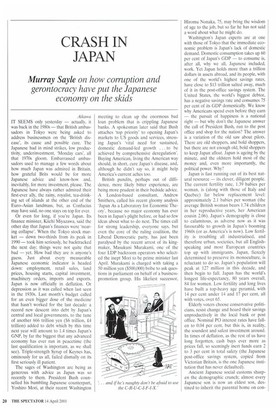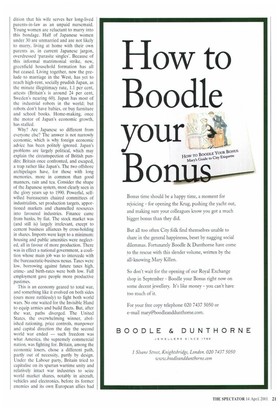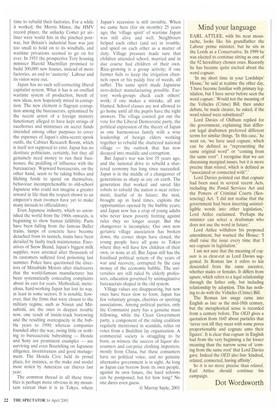CRASH IN JAPAN
Murray Sayle on how corruption and
gemntocracy have put the Japanese economy on the skids
Aikawa IT SEEMS only yesterday — actually, it was back in the 1980s — that British ambassadors in Tokyo were being asked to address businessmen on the 'British disease', its cause and possible cure. The Japanese had in mind strikes, low productivity, underinvestment, 'Monday cars', all that 1970s gloom. Embarrassed ambassadors used to manage a few words about how much Japan was admired in Britain, how grateful Brits would be for more Japanese advice and know-how and, inevitably, for more investment, please. The Japanese have always rather admired their first-ever ally, the rainy, royalist, tea-drinking set of islands at the other end of the Euro–Asian landmass, but, as Confucius may have said, no one stays on top for ever.
Or even for long, if you're Japan. Its finance minister, Kiichi Miyazawa, said the other day that Japan's finances were 'nearing collapse'. When the Tokyo stock market — down two-thirds from its peak in 1990 — took him seriously, he backtracked the next day; things were not quite that bad — yet, How bad they are is anyone's guess. Just about every measurable Japanese economic indicator is headed down: employment, retail sales, land prices, housing starts, capital investment, machinery orders, imports and exports. Japan is now officially in deflation. Or depression as it was called when last seen in the 1930s. Last month's budget called for an even bigger dose of the medicine that hasn't worked for the last decade: a record new descent into debt by Japan's central and local governments, to the tune of another 666 trillion yen ($6 trillion. £4 trillion) added to debt which by this time next year will amount to 1.4 times Japan's GNP, by far the biggest that any advanced economy has ever run in peacetime (the last qualification is important, as we shall see). Triple-strength Syrup of Keynes has, ominously for us all, failed dismally on its first seriously ill patient.
The sages of Washington are being as generous with advice as Japan was so recently to them. President Bush counselled his bumbling Japanese counterpart, Yoshiro Mori, at their recent Washington meeting to clean up the enormous bad loan problem that is crippling Japanese banks. A spokesman later said that Bush attaches 'top priority' to opening Japan's markets to US goods and services, stressing Japan's 'vital need for sustained, domestic demand-led growth . .. to be achieved by comprehensive deregulation'. Buying American, living the American way should, in short, cure Japan's disease, and, although he didn't say so, it might help America's current aches too.
British pundits, perhaps out of diffidence, more likely bitter experience, are being more prudent in their bedside advice. A London-based consultant, Andrew Smithers, called his recent gloomy analysis 'Japan As a Laboratory for Economic Theory', because no major economy has ever been in Japan's plight before, or had so few ideas about what to do next. The times call for strong leadership, everyone says, but even the core of the ruling coalition, the Liberal Democratic party, has just been paralysed by the recent arrest of its kingmaker, Masukuni Murakami, one of the four LDP backroorn operators who selected the inept Mori to be prime minister last April. Murakarni is charged with taking a 50 million yen ($500,000) bribe to ask questions in parliament on behalf of a businesspromotion group. His likeliest successor, Hiromu Nonaka. 75, may bring the wisdom of age to the job, but so far he has not said a word about what he might do.
Washington's Japan experts are at one with those of Tokyo that the immediate economic problem is Japan's lack of domestic demand. Domestic consumption takes up 60 per cent of Japan's GDP — to consume is, after all, why we all, Japanese included, work. Yet Japan holds more than a trillion dollars in assets abroad, and its people, with one of the world's highest savings rates, have close to $13 trillion salted away, much of it in the post-office savings system. The United States, the world's biggest debtor, has a negative savings rate and consumes 75 per cent of its GDP domestically. We know why Americans spend even before they earn — the pursuit of happiness is a national right — but why don't the Japanese answer the call of President Bush, run to the post office and shop for the nation? The answer is a variation of the old saw about pilots. There are old shoppers, and bold shoppers, but there are not enough old, bold shoppers to keep Japan afloat. Japan is ageing by the minute, and the oldsters hold most of the money and, even more importantly, the political power. Why?
Japan is fast running out of its best natural resource — its clever, diligent people. The current fertility rate, 1.39 babies per woman, is (along with those of Italy and Quebec) far below replacement level: approximately 2.1 babies per woman (the average British woman bears 1.74 children in her reproductive years, her American cousin 2.06). Japan's demography is close to calamitous, as adverse now as it was favourable to growth in Japan's booming 1960s (or as America's is now). Low fertility is troubling all industrialised, and therefore urban, societies, but all Englishspeaking and most European countries top up with immigrants. Japan, fiercely determined to preserve its monoculture, is reluctant to do so. Japan's population will peak at 127 million in this decade, and then begin to fall. Japan has the world's longest life-expectancy, 80 years overall, 84 for women. Low fertility and long lives have built a top-heavy age pyramid, with 14 per cent under 14 and 17 per cent, all with votes, over 65.
Elderly voters choose conservative politicians, resist change and hoard their savings unproductively in the local bank or post office. Nominal PO interest rates have fallen to 0.04 per cent. but this is, in reality, the soundest and safest investment around. In times of deflation, as the rest of us have long forgotten, cash buys ever more as prices fall, so seemingly inert funds earn 2 to 3 per cent in total safety (the Japanese post-office savings system, copied from Victorian Britain, is the one Japanese institution that has never defaulted).
Ancient Japanese social customs sharpen the demographic crunch; almost every Japanese son is now an eldest son, destined to inherit the parental home on con
dition that his wife serves her long-lived parents-in-law as an unpaid nursemaid. Young women are reluctant to marry into this bondage. Half of Japanese women under 30 are unmarried and are not likely to marry, living at home with their own parents as, in current Japanese jargon, overdressed 'parasite singles'. Because of this informal matrimonial strike, new, greenfield household formation has all but ceased. Living together, now the prelude to marriage in the West, has yet to reach high-rent, socially prudish Japan, as the minute illegitimacy rate, 1.1 per cent, attests (Britain's is around 24 per cent, Sweden's nearing 60). Japan has most of the industrial robots in the world; but robots don't have babies, or buy furniture and school books. Home-making, once the motor of Japan's economic growth, has stalled.
Why? Are Japanese so different from everyone else? The answer is not narrowly economic, which is why foreign economic advice has been politely ignored. Japan's problems are largely political, which may explain the circumspection of British pundits; Britain once confronted, and escaped, a trap rather like Japan's. The two offshore archipelagos have, for those with long memories, more in common than good manners, rain and tea. Consider the shape of the Japanese system, most clearly seen in the glory years up to 1990. Powerful, selfwilled bureaucrats chaired committees of industrialists, set production targets, apportioned markets and channelled resources into favoured industries. Finance came from banks, by fiat. The stock market was (and still is) largely irrelevant, except to cement business alliances by cross-holding in shares. Imports were kept to a minimum: housing and public amenities were neglected, all in favour of more production. There was in effect a national government, a coalition whose main job was to intercede with the bureaucratic-business nexus. Taxes were low, borrowing against future taxes high, crimeand birth-rates were both low. Full employment gave people more productive pastimes.
This is an economy geared to total war, and something like it evolved on both sides (ours more ruthlessly) to fight both world wars. No one waited for the Invisible Hand to equip armies and build fleets. But, after the war, paths diverged. The United States, the overwhelming winner, abolished rationing, price controls, manpower and capital direction the day the second world war ended — such freedom was what America, the supremely commercial nation, was fighting for. Britain, among the economic losers, chose a different path, partly out of necessity, partly by design. Under the Labour party, Britain tried to capitalise on its spartan wartime unity andrelatively intact war industries to seize world market shares, notably in aircraft, vehicles and electronics, before its former enemies and its own European allies had
time to rebuild their factories. For a while it worked; the Morris Minor, the HMV record player, the unlucky Comet jet airliner were world hits in the pinched postwar, but Britain's industrial base was just too small to hold on to its windfalls, and wartime privations seemed to go on for ever. In 1951 the prospective Tory housing minister Harold Macmillan promised to build 300,000 new houses, instead of more factories, an end to 'austerity'. Labour and its vision were out.
Japan has no such self-correcting liberal capitalist system. What it has is an ossified wartime system of production, bereft of new ideas, now hopelessly mired in corruption. The new element is flagrant corruption among the bureaucrats, epitomised by the recent arrest of a foreign ministry functionary alleged to have kept strings of racehorses and mistresses on secret funds intended among other purposes to cover the expenses of Japan's ultra-secret spook outfit, the Cabinet Research Room, which is itself not supposed to exist. Japan has no destitute politicians, certainly, but they all genuinely need money to run their businesses; the peddling of influence with the bureaucracy. Wayward bureaucrats, on the other hand, seem to be taking bribes and filching funds to spend on themselves, behaviour incomprehensible to old-school Japanese who could not imagine a greater reward in life than the respect shown to an emperor's man (women have yet to make many inroads to officialdom).
Even Japanese industry, which so astonished the world from the 1960s onwards, is beginning to show human fallibility. Parts have been falling from the famous Bullet trains, lumps of concrete have become detached from its tunnels, trains have been derailed by faulty track maintenance. Executives of Snow Brand, Japan's biggest milk supplier, were arrested after thousands of its customers suffered food poisoning last summer. Police have questioned the directors of Mitsubishi Motors after disclosures that the world-famous manufacturer has been systematically concealing complaints about its cars for years. Methodical, meticulous, hard-working Japan has lost its way, at least in some sectors. It is notable, however, that the firms that were closest to the military regime, such as Nissan and Mitsubishi, are the ones in deepest trouble now, one result of inside-track borrowing and the resulting overcapacity in the bubble years to 1990; whereas companies founded after the war, owing little or noth ing to bureaucratic babysitting Honda and Sony are prominent examples — are surviving and even flourishing on Japanese diligence, inventiveness and good management. The Honda Civic held its proud place, for instance, as the make and model most stolen by American car thieves last year.
The common thread in all these troubles is perhaps more obvious in my mountain retreat than it is in Tokyo, where Japan's recession is still invisible. When we came here (for six months) 25 years ago, the 'village spirit' of wartime Japan was still alive and well. Neighbours helped each other (and us) in trouble, and spied on each other as a matter of duty. Village pressure made sure that children attended school, married and in due course had children of their own. Rice-growing is a group activity; if one farmer fails to keep the irrigation channels open or his paddy free of weeds, all suffer. The same spirit made Japanese zero-defect manufacturing possible. Factory work-groups check each others' work; if one makes a mistake, all are blamed. School classes are not allowed to go home until all the pupils have the right answers. The village council got out the vote for the Liberal Democratic party, the political expression of the theory of Japan as one harmonious family with a wise leadership of benign elders working together to rebuild the shattered national village — the outlook that has now decayed into muddle and corruption.
But Japan's war was lost 55 years ago, and the national drive to rebuild a shattered economy has long since succeeded. Japan is in the middle of a changeover of generations as sharp as any on earth. The generation that worked and saved like robots to rebuild the nation is near retirement, fearful of its future; the next, brought up in hard times, exploits the opportunities opened by the bubble years; and Japan now has a crop of young adults who never knew poverty fretting against rules they no longer accept. But the changeover is incomplete. Our own now geriatric village association has broken down, the corner shops have closed, the young people have all gone to Tokyo where they will have few children of their own, or none at all. But Japan still has the fossilised political system of the years of war and recovery, corrupted by the easy money of the economic bubble. The universities are still ruled by elderly professors, education governed by unimaginative bureaucrats shaped in the old system.
Village values are disappearing, but new ones have been slow to form. Japan has few voluntary groups, charities or sporting associations. Among political parties, only the Communist party has a genuine mass following, while the Clean Government party, a component of the ruling coalition regularly mentioned in scandals, relies on votes from a Buddhist lay organisation. A commercial society is struggling to be born, as witness the success of liquor discounters and cut-price clothing importers, mostly from China, but these consumers have no political voice, and no genuine alternative government is in sight. As long as Japan can borrow from its own people, against its own future, the hard reforms can be postponed: but for how long? No one dares even guess.
0 Murray Sayle, 2001




























































 Previous page
Previous page